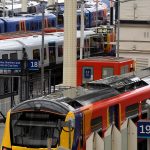Train passengers frustrated by emergency timetables will see “big improvements” in the next two weeks, it has been promised.
Hundreds of daily services were axed in December and January after the rise of the Omicron coronavirus led to crippling staff shortages.
At some points at the start of the year, it was thought about 10% of staff were absent from work on the rails.
But despite cases of the virus falling, train services remain more than a fifth below pre-pandemic levels.
Now Transport Secretary Grant Shapps has vowed to bring timetables “back up to spec” and pledged this would be “in the next couple of weeks”.
He said: “We should start to see big improvements.
“Of course, we’re timing that alongside the fact that not everyone is back to work yet – but we’re starting to see big increases in the number of people travelling.”
COVID-19: Europe entering ‘plausible endgame’ to pandemic, WHO director says
‘Kids were just giving up’: Clubs hope Winter Olympics will revive interest in ice sports as they struggle to recover from lockdowns
COVID-19: UK approves Novavax protein-based vaccine for over-18s to tackle ‘next phase’ of pandemic
Railways have a ‘bright future’
Latest provisional Department for Transport figures show the number of journeys made on Britain’s railways on Monday was at 51% of pre-pandemic levels.
Train operators say they introduced the emergency timetables to provide a more reliable service following weeks of widespread short-notice cancellations.
Follow the Daily podcast on Apple Podcasts, Google Podcasts, Spotify, Spreaker
Mr Shapps was asked if the rail industry will need to make permanent cuts to its operations as taxpayer support which has kept services running during the virus crisis is reduced.
The Cabinet minister replied: “What I want to see is railways expand not shrink.
“I’m opening new lines to do that. There’s a very bright long-term future.
“Obviously, with regards to how much people travel and at what speed they return to work, we need to make sure the timetables match that.
“But our commitment to the railways, I think, is second to none.”






















